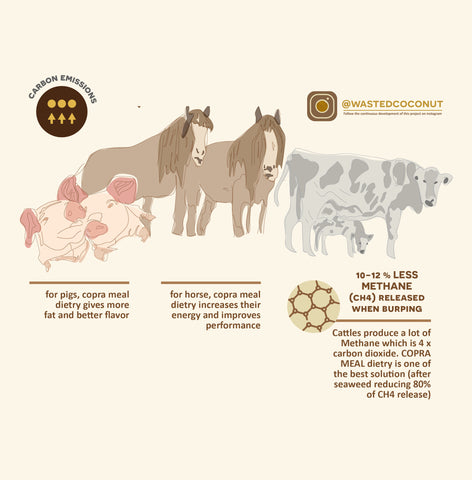Author: Nikky Yu Montesclaros
We work to solve the wide-scale problem of excess coconut waste by saving shells that would otherwise be discarded or burned as waste, and engage local artisans to transform them into beautiful bowls that people can eat from. As our solution-focussed approach involves educating the public on this sustainable issue, we invited Nikky Yu Montesclaros to share her Masters degree research on innovative materials, focusing on how coconut waste can be a driver in a 'waste movement' for a sustainable future.
Luxury waste refers to items that are high in quality and high in amount/price. Coconut waste is considered the ultimate luxury waste because there is a high amount of waste, which is equal to the quality of sustainable and economic benefits. That is, there is an abundance of coconut waste in the world despite being a quality material that can be commercialised to create economic benefits. This is considered a sustainable win-win-win.
The amount of waste is the result of many industries as there are versatile uses of coconut, from cosmetics to gastronomy. However, historically the waste remains were considered of little value, thus were of little use. With increased awareness created through businesses like Coconut Bowls, turning coconut waste into upcycled resources is starting to make change. Yet there is still excessive waste - which means there are many more opportunities for innovative solutions.
We often underestimate the amount of sustainable solutions that the humble coconut can solve. Based on the research conducted during my Masters Degree, I will summarise how coconut waste can solve such sustainable problems.
Carbon Emission Reduction
Fossil Fuel is a non-renewable resource that not only releases a lot of carbon emissions, but also has predominantly destroyed our ecosystem to a dangerous point.

Why Is Coconut Waste A Solution?
The coconut shell and coconut husk can be turned into activated charcoal and biofuel through the process of carbonisation and gasification to replace petroleum and diesel. Studies have shown that biofuel from coconut waste can run powerplant houses for manufacturing, marine vessels for logistics and generators for energy. This substitution, if consistently utilised, will reduce our dependence on fossil fuel by 65%.
Methane Reduction
Livestock release a large amount of methane, which is four times more powerful than carbon dioxide. This is a large contributor to global emissions and ultimately, climate change.

Why Is Coconut Waste A Solution?
Copra meal is dried coconut meat, and is considered a healthy food for livestock. As it consists of unsaturated fat and oil, it helps to energise the performance of horses, increases healthy fat on pigs and reduces methane released from cattle by about 15-20%. However, it is necessary to introduce copra meal into the diet slowly over time to overcome the initial reluctance of the stock.
Microfibers
Approximately 60% of the tiny debris found in marine environment are the result of microfibers coming out of textiles and clothing made of synthetic materials, particularly plastic. Clearly the problem lies in the material source.

Why Is Coconut Waste A Solution?
It is possible to produce activated carbon textile from coconut husk and shell in the process of carbonization. A company, Cocotex is doing so, highlighting coconut waste as the best material and quality of sports textile. Another surprising utilisation is textile made out of fermented coconut water waste. With its natural processing, it is possible to create a 100% compostable resource for design. A designer in Czech Republic (Malai) is currently developing this breakthrough.
Deforestation
Exploitation of rainforests has been a major issue for the health of our ecosystem. We depend on wood for a lot of things, including paper, furniture and even for construction.

Why Is Coconut Waste A Solution?
Coconut waste has one of the highest lignin content among other trees - this qualifies for effective use in textile dye, binding products (a replacement for synthetic resin), as well as treatment for roadways & construction. A company credited for this innovation is called CocoPallet from Netherlands who makes 100% coconut waste pallets to save 200 million trees from depletion.
Water Pollution
The systematic issue of how industries are contaminating water streams and sewage flow extensively limits our access to clean water. Without stronger regulations and proper treatment of this problem, we are discharged with environmental insanitation.

Why Is Coconut Waste A Solution?
Coconut husk is an excellent methylene blue (MB) adsorbent. It could provide an alternative way to adsorb dyes from pollutant source. Ecoflo CocoFilter claims coconut husk as the best filtration for water treatment without the use of energy. On a small scale solution, activated carbon from coconut waste is also a good absorbent for water filter in a bottle.
Agricultural Challenges
Philippines and other developing countries lose a lot of crops from strong typhoons and natural calamities. When you are faced with the inevitable cause of plantation and economic growth, prevention is the best approach in resolving them.

Why Is Coconut Waste A Solution?
Coconut husk is a good source of geotextile and can be used to embed soil grounds which helps to prevent landslides and pest growth for agricultural crops and plantation. Production of coir nets and ropes have long been produced and exported, but it has not been utilised to its full potential, such as by embedding road construction and soil stabilisation.
Finally, discarded coconut waste eventually grows a sprout that can encourage more coconut plantation. It goes to show that we will never run out of coconut waste and it is best to utilize a resource that is inexhaustible by nature.
In the hope that this article has provided valuable insight into the value of using coconut waste as sustainable solutions, I encourage you to continue raising awareness and spreading the word. Most importantly, if you can play a part in reducing the impact of our environmental, social and economic conditions, I invite you to partake.

To learn more about Nikky: visit @wastedcoconut







